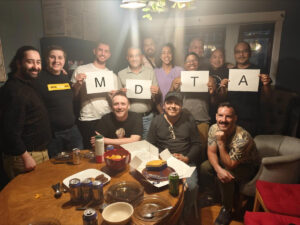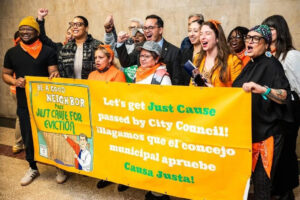
After years of affordable rents under a small independent landlord, tenants at the corner of W. Montrose and N. Dayton received a horrifying holiday surprise. Right after Christmas, tenants received a notice from Rockwell Property (representing the building’s new ownership group, Montrose Investment Partners II LLC) that they had approximately 120 days to vacate their homes so their new landlord could renovate the building.
Many tenants had lived in the building for decades. Rockwell Property offered tenants a paltry $500 on the way out and a $500 credit if they moved back into the building when the renovations were done, and rents would inevitably be unaffordable for most tenants.
Fearful that they would not be able to afford to move and angry that they could be displaced so suddenly, the tenants sprang into action and formed the Mon-Day Tenants Association (MDTA) with one simple demand: if you want us to move, pay us to do so!
The demand was far from unreasonable. If the proposed Just Cause for Eviction Ordinance were law in Chicago, the landlord would have to give tenants, displaced through no fault of their own, substantial relocation assistance.
For the first month of the campaign, building ownership refused to negotiate with the MDTA. But with the help of organizers from MTO and ONE Northside, the MDTA gathered community support, escalated public pressure, and forced the owners to the table.
After weeks of intense negotiations, the MDTA approved an agreement in which the landlord waived last month’s rent and gave each unit $2,000 upon return of their keys at move-out.
MTO is proud to congratulate the MDTA on its victory. Organizing works!

 On Wednesday, May 21, numerous supporters descended on Chicago’s City Council Meeting to support the introduction of the
On Wednesday, May 21, numerous supporters descended on Chicago’s City Council Meeting to support the introduction of the 
 When a child is harmed by lead within the home, family life gets immediately upended. This was true for Michael and Eileen Buchanan, whose 14-month-old tested positive for elevated blood lead levels. A Chicago city inspector confirmed high lead levels throughout their unit.
When a child is harmed by lead within the home, family life gets immediately upended. This was true for Michael and Eileen Buchanan, whose 14-month-old tested positive for elevated blood lead levels. A Chicago city inspector confirmed high lead levels throughout their unit.


